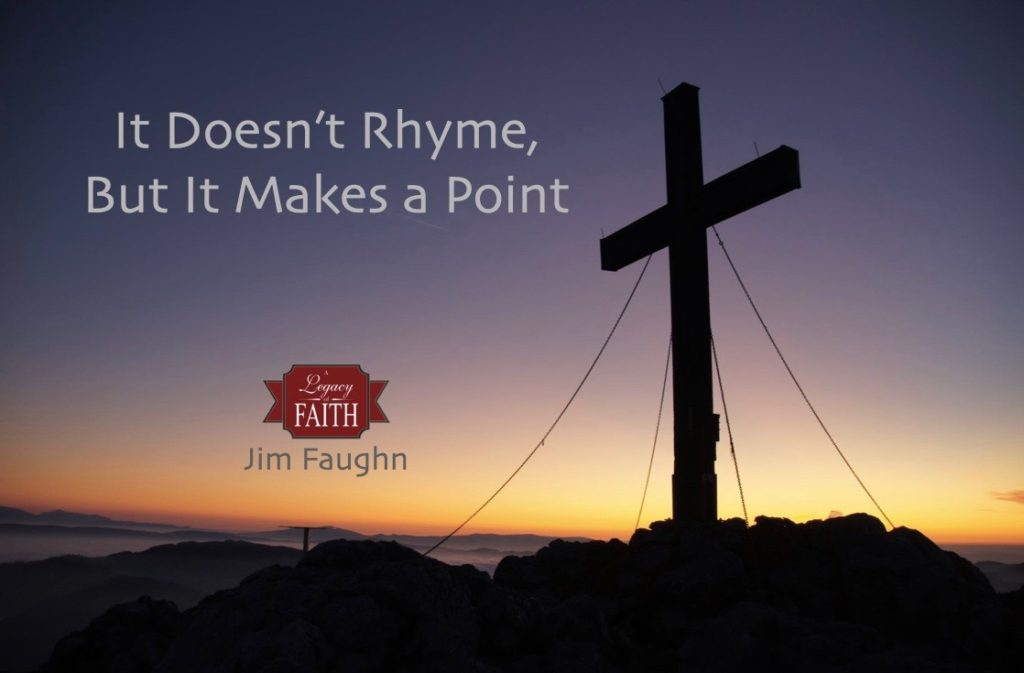It Doesn’t Rhyme, But It Makes a Point
It is amazing how what may seem to some as a “little thing” can remain in your memory for a long time. It also amazes me that some of those “little things” can make a big point. I am reminded of those things every time we sing a particular hymn when we worship.
In a few months it will be a quarter of a century since my family worshiped regularly with the church of Christ in Dexter, Missouri. After all of this time, I still remember a request that one of our song leaders made every time he led a particular song.
The song was Grace That is Greater Than All Our Sin. The request he made every time he led this hymn had to do with the wording of the first verse.
Marvelous grace of our loving Lord
Grace that exceeds our sin and our guilt
Yonder on Calvary’s mount outpoured
There where the blood of the Lamb was spilt.
Before I tell you about the request he made, I might need to let you know a little about this man. He was not some “country bumpkin” who was merely chosen at random to lead singing at the last minute. Before his retirement, he was the band director for the local middle school. He knew more about music than many of us will ever know. In fact, if you got to know him, you would realize that he was well educated in a variety of areas. That was due, in part, to the fact that he read material from a lot of different sources.
If you had the opportunity to spend time with him, you soon realized that the one source he most valued was not a book about music. Although he had an interest in both history and farming, that book is also not about either of those subjects.
The book he held (holds) in such high esteem contains information about music, farming, history, and many other subjects, but none of those is its primary theme. The central theme, subject, and person in that book is Jesus. It is for that reason that my brother in the Lord asked us to sing “shed” and not “spilt..”
Why? What difference does it make if we think of the blood of Jesus being shed rather than spilt?
One reason can be found in the choice of words that Jesus, Himself, used as He described the significance of the fruit of the vine as He instituted the Lord’s supper. Depending on the translation you have, He used words like “shed” or “poured out” in Matthew 26:28 to describe what was to happen with His blood. He did not refer to His sacrifice in terms of something being spilled.
The reason for that may be found in the definition of the word “spill.” The online dictionary of Mirriam-Webster defines the word in this way:
to cause or allow especially accidentally or unintentionally to fall, flow, or run out so as to be lost or wasted
It seems to me that the word used by Jesus and my friend contains a subtle, but very important, message. There was absolutely nothing accidental about the crucifixion of Jesus. In the words of the sermon preached on the Day of Pentecost, the crucifixion of Jesus was “…according to the definite plan and foreknowledge of God…” (Acts 2:23).
Multiple passages verify the fact that the crucifixion of Jesus was not the result of some mob mentality that got out of hand. It was not something that, in any way, “just happened.”
The blood which Jesus shed was also not, in any sense of the word, to be wasted. There was a specific and very important purpose for His sacrificial act. That purpose can also be found in Matthew 26:28. The shedding of His blood was “…for the remission/forgiveness of sins.”
Interestingly enough that same phrase is found in the sermon preached on the Day of Pentecost. The people who were there who were accused of having a role in the crucifixion of Jesus were told to:
…Repent and be baptized every one of you in the name of Jesus for the remission/forgiveness of sins.. (Acts 2:38).
Sadly, many have missed that connection. They believe and teach that baptism is something that takes place after a person becomes a Christian. The New Testament teaches otherwise.
Without minimizing the importance of a proper understanding of the role and purpose of baptism, I would like to suggest something else that is more in keeping with the difference between thinking that the blood of Jesus was spilled or shed.
It is possible that pages and pages could be written about the meanings of those two words, the plan that God had for our salvation, and multiple other related things. However, without going into a more lengthy discussion, I will end with the suggestion that Paul, by inspiration, understood what happened on the cross. He also made the application personal when he wrote that
…Christ…loved me, and gave Himself for me (Gal. 2:20).
Because of the sacrifice of Jesus and the shedding of His blood, Christians can enthusiastically sing the chorus of that great hymn with hearts that are full of gratitude.
Grace, grace, infinite grace.
Grace that will pardon and cleanse within.
Grace, grace, God’s grace.
Grace that is greater than all our sin.
To Receive Every Article from A Legacy of Faith through Email for Free, Click Here
AUTHOR: Jim Faughn



